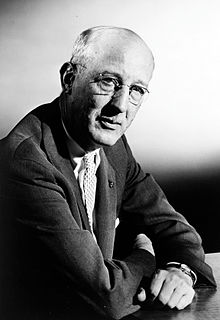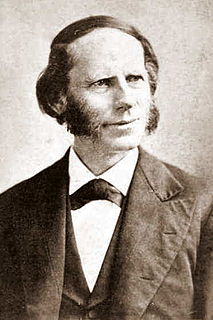A Quote by Ralph Waldo Emerson
And in cases where profound conviction has been wrought, the eloquent man is he who is no beautiful speaker, but who is inwardly drunk with a certain belief. It agitates and tears him, and perhaps almost bereaves him of the power of articulation.
Related Quotes
Man is said to be a reasoning animal. I do not know why he has not been defined as an affective or feeling animal. Perhaps that which differentiates him from other animals is feeling rather than reason. More often I have seen a cat reason than laugh or weep. Perhaps it weeps or laughs inwardly - but then perhaps, also inwardly, the crab resolves equations of the second degree.
Beneath everything else, North and West, there ran a profound, unvoiced, almost subconscious conviction that the [American] nation was going to go on growing-in size, in power, in everything a man could think of-and in that belief there was a might and a fury that would take form instantly at the moment of shock.
A rationalist, as I use the word, is a man who attempts to reach decisions by argument and perhaps, in certain cases, by compromise, rather than by violence. He is a man who would rather be unsuccessful in convincing another man by argument than successful in crushing him by force, by intimidation and threats, or even by persuasive propaganda.
The hand descended. Nearer and nearer it came. It touched the ends of his upstanding hair. He shrank down under it. It followed down after him, pressing more closely against him. Shrinking, almost shivering. He still managed to hold himself together. It was a torment, this hand that touched him and violated his instinct. He could not forget in a day all the evil that had been wrought him at the hands of men.
You can graduate a man's progress in religion by the amount of prayer, not by the number of hours perhaps, but by the earnest supplication that he puts up to God. There is no exception to the rule. Show me a man who prays and his strength and his power cannot by exaggerated. Just give to a man this power of prayer and you give him almost omnipotence.
It goes with the passionate intensity and deep conviction of the truth of a religious belief, and of course of the importance of the superstitious observances that go with it, that we should want others to share it - and the only certain way to cause a religious belief to be held by everyone is to liquidate nonbelievers. The price in blood and tears that mankind generally has had to pay for the comfort and spiritual refreshment that religion has brought to a few has been too great to justify our entrusting moral accountancy to religious belief.
It is by loving, and not by being loved, that one can come nearest the soul of another; yea, that, where two love, it is the loving of each other, that originates and perfects and assures their blessedness. I knew that love gives to him that loveth, power over any soul beloved, even if that soul know him not, bringing him inwardly close to that spirit; a power that cannot be but for good; for in proportion as selfishness intrudes, the love ceases, and the power which springs therefrom dies. Yet all love will, one day, meet with its return.
She couldn't think of anyone else who remotely resembled him. He was complicated, almost contradictory in so many ways, yet simple, a strangely erotic combination. On the surface he was a country boy, home from war, and he probably saw himself in those terms. Yet there was so much more to him. Perhaps it was the poetry that made him different, or perhaps it was the values his father had instilled in him, growing up. Either way, he seemed to savor life more fully than others appeared to, and that was what had first attracted her to him.
But let there be no misunderstanding: it is not that a real man, the object of knowledge, philosophical reflection or technological intervention, has been substituted for the soul, the illusion of theologians. The man described for us, whom we are invited to free, is already in himself the effect of a subjection more profound than himself. A 'soul' inhabits him and brings him to existence, which is itself a factor in the mastery that power exercises over the body. The soul is the effect and instrument of a political anatomy; the soul is the prison of the body.








































